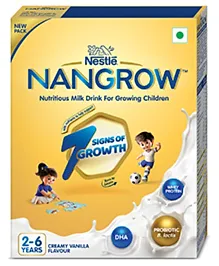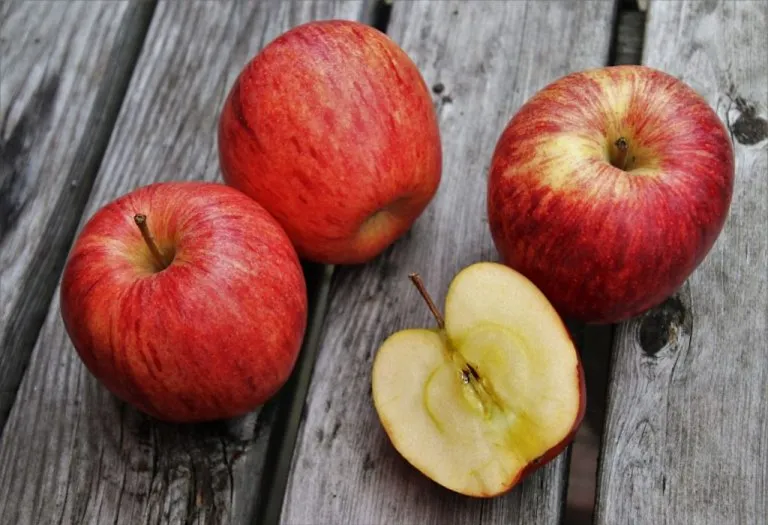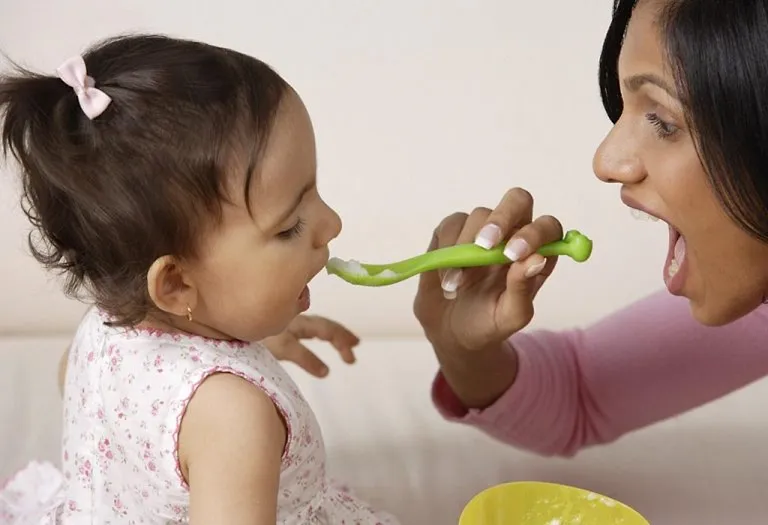How to Increase Baby’s Appetite – 10 Effective Tips

- What Are the Causes of Low Appetite in Babies?
- Symptoms of Loss of Appetite in Infants
- How to Increase Your Baby’s Appetite
- Foods That Can Help to Increase Appetite in Infants
- When to Call the Doctor
- FAQs
Food, clothing, and shelter – that’s pretty much what babies need at a very basic level, along with good sleep and a loving environment. Despite that, you may be upset that your child is not eating properly. Low appetite in babies is difficult. He may not be communicating his hunger as frequently as needed or not eating enough portions at scheduled meal times. This could affect his weight gain and cause even more worry to you regarding his growth. So, if you’re wondering how to increase a baby’s appetite naturally, here are some things you could definitely try out.
What Are the Causes of Low Appetite in Babies?
Some of the common causes of low appetite in infants are:
1. Recovering From an Illness
If your baby usually eats well but has recently shown poor eating habits, it could be because they aren’t feeling well or are just recovering from an illness. When battling an infection like a cold, ear infection, or stomach bug, the body’s energy is focused on fighting off the bug, which can slow down other processes like digestion. This naturally results in a loss of appetite. Even after the illness is gone, the after-effects or lingering symptoms (like a stuffy nose affecting smell and taste) can mean it takes a few days for their appetite to return to normal (1).
2. Zinc Deficiency
Zinc is a crucial mineral for many bodily functions, including those related to appetite (2). It is primarily responsible for the production of hydrochloric acid in the stomach, which is necessary for digestion and helps trigger the hunger sensation. A deficiency in zinc can therefore lead to a reduced appetite. This can often be corrected through diet by including zinc-rich foods appropriate for your baby’s age and stage, such as pureed chicken, fortified baby cereals, and legumes (like lentils and chickpeas). Always consult a paediatrician before adding supplements.
3. Improper Digestion
Energy is required to process and digest food. This digestive energy can be impaired by issues like indigestion, gas, constipation, or acid reflux, which are common in babies. An immature digestive system can struggle to process food efficiently, leading to discomfort and a feeling of fullness. This discomfort naturally makes a baby reluctant to eat more, creating a cycle of low appetite.
4. Slow Down of Growth
Not every phase of low appetite is a sign of a problem. Babies experience rapid growth spurts in their first few months, during which their appetite and feeding frequency are very high. After the 4-6 month mark, the growth rate naturally begins to slow down. With less energy required for growing, their appetite may reduce and become more variable. This is a normal and expected part of development (3).
5. Too Much of the Same Thing
A diet lacking variety or dominated by filling foods can suppress appetite (4). For example:
- High-Fibre Foods: If your baby is eating a lot of whole grains or high-fibre fruits and vegetables, the fibre can keep them feeling full for a long time.
- Excessive Milk Intake: For babies over one year, drinking large quantities of cow’s milk throughout the day can easily fill their small stomachs, leaving little room for solid foods. Similarly, for younger infants, overfeeding formula or breastmilk right before solid meals can ruin their appetite for more nutrient-dense foods.
6. Teething Pain
The process of teething is a very common cause of temporary appetite loss. The pain, inflammation, and general discomfort in a baby’s gums can make the act of sucking (from a breast or bottle) or chewing solid foods very painful. They may act hungry but then turn away and fuss because eating exacerbates the soreness in their mouth. This usually resolves once the tooth breaks through and the discomfort subsides (5).
7. Distractions and Developmental Milestones
As babies get older (around 9-12 months), their world becomes incredibly interesting. They are learning to crawl, pull up, and explore everything around them. This newfound mobility and curiosity can make sitting still for a meal seem boring. They are often more interested in practising their new skills and engaging with their environment than they are in eating, leading to what appears to be a decreased appetite.

Symptoms of Loss of Appetite in Infants
It can be worrying when your infant shows less interest in feeding. Recognising the signs of a true loss of appetite is the first step in identifying potential causes and ensuring your baby’s well-being.
1. Turning Away From Food
The most direct sign is a baby physically rejecting the breast, bottle, or spoon. They may turn their head away, arch their back, push the food away with their hands, or tightly clamp their mouth shut. This is a clear nonverbal cue that they are refusing to eat.
2. Fussiness or Crying During Mealtimes
Instead of peaceful feeding, your baby may become irritable, fussy, or start crying when you try to feed them. This often signals that the act of eating is causing them discomfort, which could be due to issues like gas, reflux, teething pain, or an illness like an ear infection, where sucking is painful.
3. Decrease in Overall Volume Consumed
You may notice a consistent pattern of your baby consuming less milk or formula than usual during each feed, or eating significantly smaller portions of solid food. Tracking this over 24 hours is more useful than focusing on a single meal, as appetites can fluctuate throughout the day.
4. Lack of Interest in Food They Usually Enjoy
A noticeable change in enthusiasm is a key symptom. If your baby typically gets excited for a favourite fruit or cereal but now shows complete disinterest or spits it out, it indicates a shift in their appetite rather than a simple preference.
5. Fewer Wet and Dirty Diapers
A sustained drop in appetite directly impacts output. You will likely notice a decrease in the number of wet diapers, which is a crucial sign to watch for as it can indicate dehydration. There may also be fewer frequent bowel movements if less food is being consumed overall.
How to Increase Your Baby’s Appetite
Here are some ways you could improve your little one’s appetite.
1. Offer a Nutrient-Dense Breakfast
Start the day by breaking the night-long fast with a nutritious breakfast. This kick-starts the metabolism and signals the body to expect energy. For babies, a substantial breakfast doesn’t mean large quantities but rather high nutritional value. Offer easily digestible Indian options like a small bowl of sooji (semolina) halwa sweetened with jaggery, ragi (finger millet) porridge, or moong dal cheela (blended smoothly for easy eating).
2. Shift to Smaller, More Frequent Meals
A baby’s small stomach cannot handle large meals. Ditch the rigid three-meal structure and instead offer small, portioned meals every 2-3 hours. This could look like three main meals (breakfast, lunch, dinner) and 2-3 healthy snacks in between. This keeps their energy levels stable and ensures they get adequate nutrition without feeling overwhelmed by a large plate of food.
3. Make Snacks Nutritious and Mini-Meals
The goal of a snack is to nourish, not just to fill the belly. Replace biscuits and chips with wholesome, baby-friendly Indian snacks. Think of them as mini-meals.
4. Limit Milk Intake Before Meals
In Indian households, milk is often considered a complete meal, but for toddlers, excessive milk can be a major appetite killer. Milk is filling but may not provide all the necessary nutrients when it replaces solid foods. Limit milk to no more than 400-500 ml a day and avoid offering it right before a meal. Offer water between meals instead, and use dairy in other forms like curd, paneer, or cheese in their snacks and meals.

5. Ensure Regular Physical Activity and “Tummy Time”
Physical exertion is crucial for building an appetite. For non-mobile babies, ensure plenty of tummy time, crawling practice, and interactive play on the floor. For toddlers who can walk, encourage active play. Take them to the park to run, kick a ball, or simply explore. This natural physical activity burns energy and creates a genuine need to refuel, making them more interested in their next meal.
6. Create a Positive and Cool Mealtime Environment
A stressful, hot, or distracting environment can suppress appetite. Ensure the room is cool and well-ventilated. Make mealtimes a happy, pressure-free ritual. Eat together as a family when possible. Avoid force-feeding, scolding, or distractions like TV or mobile phones. Let your baby focus on the food, its textures, and smells, which can naturally intrigue them to eat.
7. Incorporate Appetite-Boosting Indian Ingredients
Gently incorporate traditional Indian appetite-boosting ingredients into your child’s food. A pinch of ajwain (carom seeds) roasted in ghee relieves gas, a tiny amount of hing (asafoetida) in dal prevents flatulence, desi ghee aids nutrient absorption, and a few drops of lemon juice make food more appealing.
8. Serve Favourite Foods in a New Way
Sometimes, low appetite is simply due to boredom or mood. If your baby is rejecting everything, fall back on a favourite food to get them started. If they love khichdi, try presenting it differently—shape it into small balls, or add a new vegetable puree for colour. Mix a disliked vegetable with a favoured one (e.g., mix pumpkin puree into their favourite dal). The familiar taste can encourage them to begin eating, after which you can slowly introduce other items.
9. Follow a Predictable Feeding Rhythm
Offer milk and solid meals at consistent times each day. A predictable routine helps regulate a baby’s digestive system and creates natural hunger patterns. Pay attention to their hunger cues (like smacking lips or fussing) and feed them then, rather than strictly by the clock.
10. Offer Finger Foods and Encourage Self-Feeding
Once your baby is ready (around 8-9 months), offer soft, gummy finger foods they can hold themselves. This empowers them, makes mealtime exploratory and fun, and can lead to them eating more willingly. Always supervise closely during feeding.
Foods That Can Help to Increase Appetite in Infants
The following foods can help enhance appetite in babies.
1. Lemon Juice (diluted)

The sour taste of lemon can stimulate saliva production and digestive juices. For an infant over 8-9 months, a few drops of freshly squeezed lemon juice can be diluted in a cup of water. Offer just a sip or two before a meal. Never give undiluted lemon juice.
2. Plum

Plums are known to boost appetite. The nutrients present in them, combined with the peculiar taste, make them a hit with babies and are beneficial to give to your child to boost their appetite.
3. Mint (Pudina) Yogurt
Mint is known for its cooling properties and ability to settle the stomach. Blend a few fresh mint leaves into a smooth paste and mix a tiny amount into fresh yoghurt. This combination can be a refreshing and digestive side to a meal.

Image Source : AI Generated Image
4. Pumpkin Puree
Steam and puree red pumpkin (kaddu). It is sweet, easy to digest, rich in fibre, and provides vitamins and minerals that support overall health.

Image Source : AI Generated Image
5. Ajwain (Carom Seeds) Water
Ajwain is renowned in Indian households for its ability to relieve gas, colic, and indigestion. A calm, comfortable stomach is more ready to accept food. A few seeds can be boiled in water, strained, and cooled. Just a teaspoon or two of this weak ajwain water can be offered to soothe the stomach before a feed.

Image Source : AI Generated Image
6. Rasam

This South Indian soup is made with tamarind, tomatoes, and digestive spices like cumin, pepper, and coriander. Prepare a very mild, thin rasam without salt, sugar, or strong spices. Strain it thoroughly. A few spoons of this lukewarm, diluted broth can be offered before a meal to stimulate appetite.
7. Dahi
Plain, homemade yoghurt is a natural probiotic that helps populate the gut with healthy bacteria, promoting overall digestive health. Full-fat, slightly sour yoghurt can be given to babies over 8 months. Start with a few spoonfuls. You can mix in a pinch of roasted cumin powder (jeera) for added digestive benefits.

Image Source : AI Generated Image
8. Ginger

Ginger is a powerful digestive aid. However, it must be used very sparingly for infants. A tiny sliver of ginger can be boiled in water to make a very mild tea. After straining and cooling, a few drops can be given. Never give raw ginger to an infant.
9. Turmeric

Treating everything from infections to indigestion, mixing turmeric with some ghee and giving it to your child before meals can steadily bring back the appetite he had.
10. Daalchini

Also known as cinnamon, the presence of hydroxychalcone in its constitution makes it a powerful ingredient to boost appetite by adding it to various food items.
11. Hing
Hing is a classic remedy for preventing gas and flatulence, which can cause a false sense of fullness. A tiny pinch of hing is fried in a drop of ghee and then mixed into the baby’s khichdi or dal. This makes the food easier to digest and less likely to cause gas.

12. Ghee
Ghee is a rich source of healthy fats and is considered very easy to digest in Ayurveda. It helps strengthen the digestive fire (agni). A few drops of pure, homemade ghee can be mixed into your baby’s khichdi, dal, or vegetable puree.
When to Call the Doctor
While a temporary dip in appetite is often normal, certain signs warrant a call to your paediatrician. It’s important to distinguish between typical picky eating and symptoms that could indicate an underlying health issue.
Here are key signs that it’s time to call the doctor:
- If your baby shows signs of dehydration. This includes:
– Fewer than six wet diapers in 24 hours.
– No tears when crying.
– A sunken soft spot (fontanelle) on the head.
– Unusual drowsiness or lethargy.
– Dry mouth or lips. - If low appetite is accompanied by a fever, vomiting, diarrhoea, or a widespread rash.
- If your baby is unusually lethargic, floppy, or difficult to wake for feedings.
- If you notice significant weight loss or a complete failure to gain weight over time.
- If the low appetite is persistent and lasts for more than a few days without any other obvious cause (like teething).
- If your baby shows signs of pain or extreme discomfort, such as consistent crying during or after feeds, this could indicate reflux, an allergy, or another medical condition.
- If your infant (under 3 months) is refusing multiple feeds in a row.
FAQs
1. Could my baby’s appetite be linked to underdeveloped oral motor skills?
This is an uncommon but important consideration. Sometimes, a lack of interest in eating isn’t about hunger but rather difficulty with the mechanics of eating. Babies with low muscle tone or who are delayed in developing oral motor skills may find sucking, chewing, or swallowing tiring or frustrating, leading them to refuse food. A feeding therapist can assess if this is the cause (6).
2. Can a lack of appetite be a behavioural response to parental anxiety?
This is a subtle psychological factor. Babies are highly attuned to their parents’ emotions. If mealtimes become high-pressure environments filled with parental stress, anxiety, and forceful feeding attempts, a baby may develop a negative association with eating. Their refusal to eat can then become a behavioural response to the tension, rather than a true lack of hunger.
Loss of appetite is not a new thing in children. Restoring appetite takes only a few techniques. For parents seeking natural methods to increase baby hunger, focusing on zinc-rich foods and plenty of physical activity can be effective strategies. Instilling good eating habits from an early age goes a long way in keeping kids healthy. Use these tips and tricks to increase your child’s appetite if he isn’t eating enough.
Also Read:
Overfeeding Infant
Age Wise Guide to Feeding Your Baby
Baby Not Eating Food – Reasons and Feeding Tips
Was This Article Helpful?
Parenting is a huge responsibility, for you as a caregiver, but also for us as a parenting content platform. We understand that and take our responsibility of creating credible content seriously. FirstCry Parenting articles are written and published only after extensive research using factually sound references to deliver quality content that is accurate, validated by experts, and completely reliable. To understand how we go about creating content that is credible, read our editorial policy here.

























.svg)


















